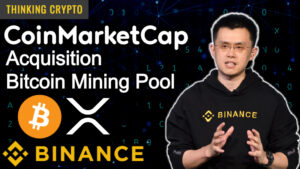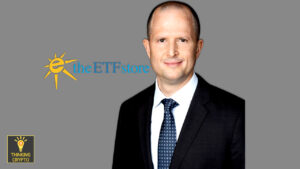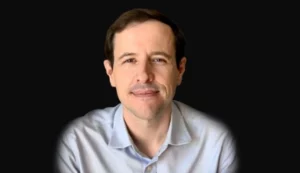Jeremy Allaire the co-founder, chairman, and CEO of Circle which is a leader in the stablecoins market with USDC and its payments solutions. In this interview we discuss how USDC works, recent adoption from VISA, and running on the Ethereum, Algorand, Stellar, and Solana blockchains.
Jeremy talks about how USDC will function along side Central Bank Digital Currencies (CBDCs). We also discuss Bitcoin’s growth, price prediction, BTC mining in the US, and US Crypto regulations. Jeremy also briefly talks about Ripple XRP and DeFi.
Listen to the Podcast Audio
Interview Transcription
Tony Edward: [00:00:10] Hi, everyone. Welcome back to the Thinking Crypto channel. I have a very special guest with me, Jeremy Allaire, who’s the co-founder, Chairman, and CEO of Circle. Jeremy, it’s great to be speaking with you today.
Jeremy Allaire: Thank you so much. It’s great to be here.
Tony Edward: Jeremy, I view you and the folks at Circle as leaders in the crypto industry and there’s so many things I want to get your perspective on. But before we get to Bitcoin and the market and USDC, let’s start with your background. Where are you from? Where’d you grow up?
Jeremy Allaire: Yeah. So, I was born in Philadelphia, and then eventually grew up in Minnesota. And, yeah, I got started as an entrepreneur in the internet industry really back in the early 90s, before the web, and worked on a number of companies back in 1994-1995. Helped create a company with my brother called Allaire Corporation, which actually ended up growing to be a significant-sized global public company. And we created one of the very first web programming languages called ColdFusion. And we built some of the infrastructures that people use still really broadly on the internet today to run interactive applications on the web. We built the most popular HTML design tool with millions of users at the time. It was a significant business that we then eventually merged into a larger internet software company called Macromedia where I was then Chief Technology Officer, and really worked on essentially upgrading the internet to be kind of user experience ready for broadband and working with flash and the flash platform, which had a huge growth period.
And then eventually, after a number of years there, around 2002-2003 became kind of obsessed with how can we bring television to the internet? How can we actually use the internet as an open platform, it’s an open network to disintermediate the traditional centralized platforms for media distribution [inaudible 00:02:17] and I found a new company called Brightcove, which is now a significant scale, global publicly-traded company, and really built that out over a number of years. And then, in 2012, I fell down or went down the crypto rabbit hole. And I’m still very far down in there, and I’ve been working on Circle basically since 2013.
Tony Edward: That’s amazing. And you are certainly one of the internet OGs, so to speak. And I have to ask because I’ve interviewed Brendan Eich, who created JavaScript. Do you know Brendan, have you moved, you know, in the 90s, were you guys maybe in contact at all?
Jeremy Allaire: Yeah. I mean, obviously, like, we worked a lot on programming language, virtual machines. Actually, we collaborated around the ECMAScript standard, which is sort of the industry that was like the open standard version of JavaScript. And yeah, absolutely. So, was very close to all of that work.
Tony Edward: So, what was your first encounter with let’s say, Bitcoin? Did someone tell you about it? Did you find it on your own?
Jeremy Allaire: Yeah. I mean, so I found it on my own just like sort of tech blog reading. And I don’t actually remember the specific blog piece, but then I started kind of continuing to kind of read more. And it was just one of those things where, as a technologist, I was like, how is this possible? Like, wait, I need to better understand this. And so then, I like dove in and had my first blockchain wallet, Bitcoin wallet, started testing actual Bitcoin transactions. And I think it was — I have a few different light bulb moments in my career and sort of synchronizing the blockchain and being able to conduct transactions directly on my computer back then, it was just very clearly a revolutionary thing. And my other background that I didn’t really talk about is that I studied kind of what I called global political economy, in college and remain very, very interested in global economic affairs, in international competitive economics, and how the international monetary system functions.
And actually, that interest accelerated for me after the financial crisis. I spent a lot of time in that area. And so the sort of the open internet and what it can do with Open Standards and Technology, kind of converging with my interest in sort of future significant, if not ultimately, revolutionary changes to the way the financial system works, that I believe are necessary for humanity really made this something quite powerful in terms of an interest for me very quickly.
Tony Edward: Sure. And I’m assuming some of these ideas, or the genesis of these ideas led to you co-founding Circle?
Jeremy Allaire: Yeah, absolutely. Yeah. So, just once I was immersed in it, thinking about the implications of it, thinking about how that might evolve, the way that we think about what banks are, the way that we think about even how money moves. And I think early ideas that we had that really inspired founding Circle were — And if you go back to early 2013, as an example, there were quite vibrant technical communities already around Bitcoin. And there are a lot of different points of view on how to evolve things. But the things that got me really excited were that this could be like a new infrastructure layer we could build a lot of other things on top of. And I saw Bitcoin as a sort of commodity money is super interesting.
But also saw the concept of this public infrastructure that was secured by something like that digital commodity is really exciting, and the idea of issuing assets on top of this network infrastructure and the ability to create smart contracts, which back then there were Nick Szabo white papers, and people in various news groups, you know, online forums sort of talking about ideas. But that idea of taking the programmability of these, what we now call digital assets, taking that forward, again, as a technologist that had worked on fundamental things like programming languages and virtual machines and app infrastructure, I could see, this would be a profound new way for software to interact with financial assets. And that basically convinced me that you could ultimately kind of reconstruct what we think of as financial services and products that you might get from a bank, but you, in the future, might get from machines. And that all is stuff that we saw when we were founding Circle as inevitable, and that we wanted to kind of work towards seeing those things come about.
Tony Edward: Sure. And what are the services that Circle currently provides? And of course, I know, USDC is a big part of that, but if you can give us the holistic vision of the company.
Jeremy Allaire: Yeah, sure. I mean, at a high level, just to share one thing, which is a number of years ago, having kind of iterated on the different kinds of technologies that would make moving what we think of as traditional money, like the liabilities of a central bank, making that really easy to move on the internet, sort of the technology made more of that possible. But it was also coming up with the governance frameworks, the regulatory frameworks, the assurances that ultimately market participants would need for something like a dollar digital currency to function on the internet. So, we, several years ago, basically put a lot of our effort into how do we construct that and construct a standard for how that can work. And that standard can be an open standard that multiple industry participants can contribute to its open-source itself, and then the governance around how that system operates would be a kind of multi-stakeholder governance model. And so we created CENTRE, CENTRE Consortium.
And when Circle was launching the initial platform for USDC in 2018, we ended up finding a great partnership with Coinbase, who shares our vision for an open financial system and a lot of shared ideas. And they got involved in CENTRE and became a really critical distribution platform for USDC in those early days, and obviously, still now. But we basically, first, sort of said, “Okay. How do we create a market infrastructure for these like dollar digital currency?” Or what we intend over time to be really any major Fiat digital currency, should be able to use these kinds of protocols, but we started obviously, with the most important international settlement currency and obviously, the currency that was most relevant to kind of pricing and liquidity in the crypto markets. So, we built up USDC and launched that and I think very quickly became the largest kind of regulated dollar digital currency and lots of companies in the ecosystem building around it. And now kind of fast forward, I mean, essentially, that’s grown tremendously, and so Circle basically has built out a whole suite of services around that sure, as well. So, they’re sort of operating the USDC market infrastructure, which is really, really critical and a ton of people use services for us to kind of automate liquidity and interact with that.
And then the second was this whole suite of the Circle account and Circle API services that we built out very significantly over the last year. Which basically allows a business or a FinTech or a commerce firm or even a bank, any type of firm, to have a seamless way to automate moving from the legacy financial system, into the digital currency native system, to manage account infrastructure that custodies and stores that and then to manage and abstract away all of the kind of transaction management for dealing with stable coins on these public networks. And that whole suite of services has — the kind of capabilities are quite broad. And now we have a very fast ramping business there with a lot of companies that need that connectivity between credit card networks, bank networks, other currencies in the world. And that also more and more companies that are new to this, they need the core infrastructure to, you know, they’re not going to build out their own custody infrastructure, they’re not going to build out their own and run their own nodes. They don’t know how to kind of manage scalability. And so just having a kind of underlying account, custody, security, and blockchain management infrastructure is really valuable too. So, that’s another piece of what we do.
And then the third piece, which we’ve talked about a little bit publicly, and there’s info on our website, but we’ll launch soon is Circle’s new yield services, that are really aimed at businesses, not at retail individuals. Everything we’re doing is aimed at businesses. And that product will allow business to convert into USDC, and then put it through a lending platform that generates four to 8% APY yield as well.
Tony Edward: Wow. That’s awesome. And I’ve seen the success and the growth for you guys with USDC. And I did have a question and it was actually one from the community. Currently, USDC, if I’m saying this correctly, is positioned on four different blockchains; Etherium, Algorand, Solano, and then just recently, Stellar. Can you explain the dynamic of that? And is your plan to be on one single blockchain or more blockchains? And what’s your thought process there?
Jeremy Allaire: Yeah. So, I mean, at a high level, we think of USDC as like a money format and a protocol. So, if you think about HTML and HTTP as sort of a content format and a protocol, it’s ridiculous to imagine that you can only use the web on one operating system. The whole idea of having a standard that’s interoperable is that it can operate on multiple platforms. And these public chains are like operating systems, essentially. They’re compute engines, they’re their own kind of proprietary kind of data and transaction management. And there’s an enormous amount of innovation happening in that space. We are not maximalists on any given chain. What we are, is we want to make sure that these standards and protocols that are needed for how money moves on the internet should work on major platforms that can support that capability. Just like the web protocols work on a Samsung refrigerator, they work on an embedded mobile device, they work on Windows, on Mac, on Linux, and all these things.
We want USDC and this is really a CENTRE Consortium thing, which is to define a framework for multi-chain USDC, defined a framework for working with blockchain projects that wanted to bring USDC to those chains, established a whole set of criteria on how to do that. There’s a lot of like technical security, audit, reliability, there’s a whole bunch of things that go into that which I won’t get into the detail on. But that’s a framework. And so right now, as you can see from what’s going on with layer one, there’s a huge amount of competition there. And there’s a lot of innovation. Right now everyone is aware of gas fees, and the limitations of the scalability of Etherium. That’s really plagued it for years. But the industry is ready for global scale retail payments to run on this infrastructure, capital markets to run on this infrastructure. And we need to be able to do that today. And so we really focused on a number of chains that we think are quite novel and support a number of these cases and there’ll be more. Absolutely.
Tony Edward: Awesome. And I love your vision for that and the non-maximalism. I think, to your point, you did the analogy right with how the internet is interoperable, different devices, operating systems, and so forth. So, that’s awesome. Now, you did tweet out something that if USDC hits 20 billion in volume, you would do a rap video. Can you tell us about that?
Jeremy Allaire: Yeah, I did. I did. So, that actually is my head of sales and revenue. He had lost a challenge where he ended up having to do I think it was 75 push-ups publicly. But he issued a challenge and he had given out a number and I said it’s got to be higher. It was like too low. But unfortunately, I think it’s almost certain at this point that I’m going to be producing a rap video about USDC later this year.
Tony Edward: Well, that’s a good problem to have, right, the success that comes with it. So, there was some news of Visa integration of using USDC. Can you tell us about that relationship?
Jeremy Allaire: Yeah, absolutely. So, in December, we announced a broad partnership with Visa, it spans a number of different areas. It includes, I think, most notably work that we’re doing with Visa to enable, essentially digital wallets that they work with all around the world, who are digital wallets that issue Visa cards, or virtual cards and credentials, to be able to support a seamless way to receive payments in USDC. And then to use USDC, as essentially the electronic stored value behind the card transaction. And so I think they’re very, very interested as are we in internet commerce and marketplace, businesses and others that really need to pay people all around the world. And basically using USDC as the settlement infrastructure to do that, and enable that payment activity to happen globally. So, if you’re someone who’s involved in an internet platform, and you need to receive your payment, you can do that into a digital wallet, all done through crypto, and then just spend that right away at a terminal. There’s more that we’re doing there. We have a number of things that we’re doing together with Visa to introduce Circle’s infrastructure and USDC to their broad network of FinTech firms and financial institutions and others that they work with. And so that’s a key part of the partnership as well, which is ramping up quite a bit.
Tony Edward: That’s awesome. And I’m certainly a big partner for you guys. And I know, it looks like all these credit card companies, we just heard from MasterCard are looking to expand their horizons in the crypto market. I did want to ask because I saw on your website, and it relates to something you tweeted about recently, with companies putting Bitcoin on their balance sheet. You alluded to another avenue or way to do this is through USDC. And there is an initiative, Dollar Stablecoins and Corporate Treasury Management Initiative. Are those two things related?
Jeremy Allaire: Yeah, absolutely. I mean, so when we think about what Circle operates with a Circle account, and the infrastructure that we provide we describe it as sort of payments in treasury infrastructure for the internet. And when you think about what a business is, at the core is their treasury, and that treasury is where they hold their value, and their treasury is, they attach it to various different ways to move value and support payments in and out. We think more and more of that activity will be digital currency native. But we also think the storage of money and actually how people take their working capital that they might have, and find ways if they’re not using that working capital to generate a return from it. And that’s sort of the cash management side of what you think of in traditional kind of corporate treasury, commercial banking, etc. We see a huge opportunity for that, that is crypto native. And so yeah, the first thing that we’re doing is what I talked about earlier, which is, essentially, if you don’t necessarily want to buy Bitcoin and put it on your corporate balance sheet or in your treasury, you can get exposure to what’s happening in that market, by essentially converting into USDC. The USDC then gets lent out into the crypto markets, and you’re effectively getting a passive yield from the market activity that’s going on in crypto.
Tony Edward: Okay. So, that totally makes sense. It’s another option for corporations if you don’t want to buy Bitcoins.
Jeremy Allaire: Absolutely. So, some corporations will want to have assets denominated in BTC, or ETH, or what have you. And some corporations are happy to say I’m interested in what is going on over there. But I’d like a dollar asset, basically, a dollar denominated asset, and that sometimes is, you know, that’s quite a large market actually. You know, when you look at the trillions of dollars that sits on corporate balance sheets around the world, a lot of that is in these sort of dollar-based kind of products, money markets, things like that.
Tony Edward: Sure. So, I’m assuming you may be knocking on Elon Musk’s door, maybe Micro Strategies — [crosstalk]
Jeremy Allaire: I tweeted that. I tweeted to him. And, hopefully, we’ll hear back from his CFO or treasurer.
Tony Edward: For sure. So, I do want to ask you about central bank digital currencies. Obviously, central banks around the globe are looking to build their own digital version of their Fiats. Do you see that as a competition, something that might take market share from you, or it complements what you’re doing because USD sees more for retail, but also for corporates, but the central banks can use their own CBDCs among themselves?
Jeremy Allaire: Yeah. I mean I’ve talked extensively about this and they’re episodes on my podcast, lots of stuff that talked about this. But just very quickly, in summary, we really believe that, in most parts of the world, including most certainly in the United States, and Europe, and many other markets that the history of electronic money is, is a history of private sector actors coming together in consortium to define standards and technologies and interoperability, and then enabling those networks to achieve scale. And that is basically how nearly all kind of electronic money works for businesses and individuals in the world. We don’t think it’s going to be any different going forward. We think it’s very much the same thing. And one of the things that in the United States, certainly, which is true, is that there’s an enormous amount of private-sector innovation. The federal government isn’t, you know, building things, really. They’re helping ensure that there’s rules of the road, they’re making sure things are safe and sound, and that risks are managed appropriately. And I think that’s really what the role is of financial regulators and central banks.
They obviously want to maintain their ability to issue debt, their ability to collect taxes, those are really critical functions. But fundamental innovation and infrastructure for how money operates, that’s going to come from the private sector. And most notably, we’re entering the age, the sort of age of internet money, and of financial system built entirely on the internet. And that’s much more different as well. Because it’s going to be built on open-source software, it’s going to be built on open protocols, it’s going to be built on decentralized infrastructure that works all around the world. That’s how the internet’s built in virtually everything else. And that’s how it’s going to be built in this new financial system. And I think that the kind of, again, the innovation and the advancements, and frankly, ultimately, the resiliency that comes from that is going to be far, far greater than any government agency would ever be able to do.
So, I think what’s more likely is central banks will sort of look at arrangements like CENTRE Consortium and they’ll say, “Hey, this is really critically important. We want to make sure it’s safe and sound, and the risks are managed well, the reserves can be — could potentially be reserves held in a central bank, those kinds of things.” So, that may be really how it evolves. And that’s what the IMF and I also call hybrid CBDC. Which is to say the kind of reserves and relationship to the central bank is a kind of supervised activity, but the actual execution on this is private sector-based.
Tony Edward: Sure. So, Jeremy, if you don’t mind me asking, would an ideal scenario for you be the Federal Reserve says, Jeremy, we want to adopt USDC? That’s going to be our CBDC.
Jeremy Allaire: Well, I doubt that that’ll happen anytime soon. But I think we certainly, as a member of CENTRE Consortium, we would like to see more really high-quality payment networks, large consumer FinTech firms, and even banks be involved in setting those standards and implementing that sort of interoperability. But it’s not just about the United States, this is a global phenomenon. And countries around the world want to also access this innovation. As you know, crypto finance firms are innovating in every country in the world right now. And so there’s an opportunity to tap all that innovation and connect local currencies to the same set of standards so you effectively have the ability to move value across digital Fiat, if you will, at the speed of the internet, the cost-efficiency of the internet. And I think you’re going to see a lot more of that over the next couple of years.
Tony Edward: For sure. So, I do want to ask, and I know, many things are sometimes under NDA and in the process, and you have your PR releases. But any hints you can give to us as to what may be coming for Circle or USDC in the upcoming months?
Jeremy Allaire: I mean, we’re always working on stuff. I think we — I can talk about a couple of things. I think one I’ve alluded to, which is how to make it easy for businesses to basically take advantage of what’s happening with yield around things like USDC. So, that’s really important and I think when people think about what’s going to bring more businesses into using digital currency; I think that’s going to be one of the first things that really matter. And then as businesses do that, they’ll say, wow, these stablecoins are really powerful. This is an incredible way to settle a transaction, how else could I use this across my business? And then they’ll see this ecosystem of smart contracts and innovations that they can connect to and take advantage of. And so I think those flywheels get going. And so we’re very focused on that. And related to that, I think one thing is, we really see an opportunity to create the best on-ramp possible for businesses that want to take advantage of what’s happening with this kind of infrastructure and digital currency. And so that’s really a big focus for us and just continuing to improve that, that user experience for businesses that want to get involved, not just retail investors, or traders and things like that. But really, businesses who want to actually start to take advantage of this infrastructure in powerful ways for both their bottom line and their operating efficiency.
Tony Edward: That’s awesome. And I think certainly, it’s very — the ability to earn yield on the USDC is certainly appealing. That has me thinking about a few things. And I don’t know, that’s available to retailers, just for corporates. But any plans for retail to be involved in that?
Jeremy Allaire: We’re purely focused on being a platform for businesses. But there are tons of companies that are retail facing that build on top of what we’re doing. And so we want to just enable that whole ecosystem to thrive. We work with many, many fantastic retail-facing products and services, and want to keep supporting this.
Tony Edward: Awesome. So, I want to switch gears a bit and talk about Bitcoin, which has been on a serious rally, and we hit 48,000, I think it was yesterday, some new all-time highs. Give me your perspective as someone who’s been here since 2012. And I’m sure you’re holding some Bitcoin. What’s your thoughts on the whole bull market that’s happening?
Jeremy Allaire: Well, I’m not surprised at all. So, I mean, my view, kind of coming into the year was that just given various dynamics, or even, not just coming into the year, but really, last year, that sort of felt like, the sort of next logical place would be in the 40,000s. And that happened pretty quickly. I think very clearly, the next logical place from here is in the 60,000s. That’s, I think, likely to happen in the coming months. And I think what we’re seeing is a huge build-out of this. And there’s an enormous amount of activity where this is becoming a significant asset for a much broader base of holders. And, yeah, so I mean, my view is that seeing Bitcoin in the 150 to 200,000 range is very much in sight right now, just high level, how I think about the pricing dynamics.
Now, will there be sharp pullbacks? Will it be sustained pullbacks? Sure. I mean, it would make sense for something as volatile as this. But, the fundamentals are so strong. And I think the demand side of this is very, very strong and will continue to be given what’s happening in a global macro context. It has that. And I think the more this becomes a balance sheet asset for financial institutions for corporations. I think very likely this will be a balance sheet asset for some number of central banks in the world. As that happens, I think this Bitcoin certainly grows towards reserve currency status, certainly in the next decade.
Tony Edward: Yeah. And it’s amazing to see what’s taking place, the adoption from corporates, obviously Elon Musk and Tesla. But I recently interviewed the Mayor of Miami and I know he had a press conference last night. They’re looking to put or allocate some of the city’s treasuries to Bitcoin. Do you see a pushback from like the likes of the IMF and just some government officials? Because it’s like, wait a minute.
Jeremy Allaire: Sure. Sure. I mean, I think there is still a massive disconnect. I think that there’s — and what I would describe is there’s still a massive amount of cognitive dissonance that occurs. I think that the concept of non-state commodity money is something that most people in power, most people who run governments are very uncomfortable with, even though that is largely the history of money. People for the last 50-60 years have really been accustomed to Fiat as we understand it. And the notion that the world may be making a major change back to non-sovereign commodity money, it’s very disorienting for people. And especially, I think a lot of the people who are in positions of power in government or supranational monetary authorities or other things. I think while they will profess an openness to technical innovation, it tends to be how can we improve the payment system? How can we make things more efficient? It’s never in the actual underlying basis of money in the monetary system.
And I think that something that is truly built as a decentralized internet-based form of commodity money, I just think it’s very hard for people to understand. And I think that cognitive dissonance leads people to be extremely dismissive. And I think there is a very real, and what will be a growing set of sharp divisions that will be expressed, I think, increasingly in a political context, in countries all around the world, between those that believe in hard money and those that believe in debt-based money in the traditional Fiat sense. And there can be some battles spawn. And I think that’s going to be the case in many places. You see the rhetoric is really picking up in some quarters. And I think, in particular, in countries with very weak currencies, you’re going to see large sectors of society opting into a non-sovereign form of digital money, but also things like stablecoins as well. And so there are real sovereignty issues and I do believe that that’s going to cause crisis in more places in the world. And so that’s something that we’re going to have to confront.
Tony Edward: Yeah, absolutely. And the trend that started, do you see Google, Apple, Amazons of the world starting to put Bitcoin in their balance sheet sometime this year?
Jeremy Allaire: Yeah, I don’t know about that. Yeah, I don’t know that I would say that. That’s a foregone conclusion at all.
Tony Edward: Got it. It’s just to be seen, I guess. But I personally, because I hold Bitcoin, I’m hoping under the green flag from Elon, that this trend continues. But we’ll have to wait and see, I guess. And as far as Bitcoin mining, there seems to be a boom happening here in the United States. And do you see kind of a global macroeconomic battle for the control of hash rate of Bitcoin given — We just heard about Russia and Siberia 20,000 mining machines are there and in the US some of the biggest mining farms being built in the world.
Jeremy Allaire: Yeah. I mean, I’ve talked about this. And I’ve said publicly as well, that I think there is an increasing concern with senior national security officials in the united states that the concentration of hash power in certain geographies poses a risk economically. That’s significant. I think you’re going to see more state-backed efforts to support regional, you know, kind of mining and data CENTRE infrastructure that is oriented towards securing crypto networks. At the end of the day, if you look at blockchains, as effectively as these crypto networks that have many, many applications, many, many uses and having crypto networks that are censorship-resistant, that also can withstand nation-state attack vectors is really critical. And so I do believe that increasingly, countries will treat their involvement in these global public crypto networks as a strategic priority.
I’ve said as well, that I think ultimately, that even proof of work, mining is going to continue to lead to some of the most significant breakthroughs in renewable energy as well. And we’re already seeing that an enormous amount of what’s taking place is focused on optimizing for the cost of electricity. And if you want to optimize for the cost of electricity, you want to get as close to free as possible. And the only way to get it as close to free as possible is by harvesting renewable energy. And so I don’t think people quite realize that. When people talk about a green new deal in the United States, I think that needs to include investments to support North American mining, very specifically green energy mining infrastructure, that’ll create jobs, it’ll create renewable energy jobs, it will create economic opportunity in communities around the country. And so I hope to see Joe Biden talking about how the United States is going to be a world leader in Bitcoin mining, and it’s going to be part of our effort to meet the obligations of the Paris accords.
Tony Edward: Sure. And do you see the Biden administration not to get political and right and left, but more crypto-friendly? I know, towards the end of Trump’s administration, Mnuchin tried to throw in some wallet regulations and Jay Clayton did some stuff with Ripple. Do you see maybe a greater path forward for crypto under this administration?
Jeremy Allaire: You know, I think it’s really easy to sort of try and think that there’s a person or a group of people that are going to sway this way or that way. I think the important thing about the federal government is that these agencies, these agencies that are really kind of stewards of oversight. You know, these are staffed by I think career civil servants. There’s an enormous amount of, and in Congress too, I mean, the policy staffers that work the hill, all these people. And what I would say is, it’s remarkable how much more educated and engaged policymakers are in every tier of government, from small offices of relatively small congressional districts up to leadership of the SEC, like Gary Gensler.
So, there’s a lot of education, there’s a lot more awareness. This has obviously become a critical set of emerging market infrastructure. I think that you’re going to see engagement, it’s going to be constructive, people are going to want to figure it out. This is not going to be knee-jerk reactions and things like that. I think people want to get it right. They understand this is a significant infrastructure. So, I’m quite optimistic and I think we are certainly on a positive side. We’re now in a political environment and in the federal government, as well, where I think there’s more of a sense that things can get done. I think there was, I think, less of a sense that things could get done over the past four years. And so I’m cautiously optimistic.
Tony Edward: And I know, I’ve seen you and just even Circle mentioned in the efforts to lobby and to bring dialogue and discourse with the folks in DC. Can you tell us a bit about what you guys are doing as far as initiatives? Is it lobbying, is it just setting up groups, alliances, and so forth?
Jeremy Allaire: I think we’re just very supportive of the groups that have spent incredible amounts of time and energy in DC over the years. We’re contributors to Coin Center, we’re members of a Blockchain Association, we’re members of the Digital Chamber of Commerce, and we’re very active in all those. And those are really the groups that are doing the work. And so certainly, I spend some time myself involved with and engaged with policymakers from time to time. But really, it’s about just building up industry’s presence overall.
Tony Edward: Sure. And I appreciate you doing that. I think a lot of folks look to you and Circle’s actions and steps you guys have taken. So, definitely appreciate that. I do want to get your thoughts, I know we’re wrapping up on time here, on the Ripple SEC lawsuit situation, what are your thoughts on that whole thing?
Jeremy Allaire: Yeah. I haven’t read the case or the responses. And so I would say I have a pretty uninformed opinion about it. So, I’m not probably the best person to comment on the details or the merits of that. I mean, I think there are a lot of companies in the industry that have supported Ripple as a virtual currency for a very long time. And again, I don’t really have a view into the facts and circumstances or merits there. I expect that this will be pretty involved back and forth over the coming years.
Tony Edward: Sure. So, I do want to talk about DeFi, get your thoughts on that. And I see exponential opportunities with DeFi, what are your thoughts on it?
Jeremy Allaire: Absolutely. I mean when we founded Circle, the thing that got us most excited was once we got to a phase where you had Fiat digital currencies like USDC, that the programmability of that money and of digital assets more broadly, it was going to really foster huge amounts of innovation in how financial services and financial market infrastructure could function. And so it’s just incredibly exciting to see that happen. I think we’re in the, whatever you want to call it, the first inning, the second inning. We’re still very early in that and I think we’re very big believers that decentralized finance and that kind of model for markets and for market infrastructure is going to become a backbone of the global economic system over time.
Tony Edward: Awesome. So, final question here as we wrap it up, some rapid-fire questions. What’s your favorite food?
Jeremy Allaire: Indian food.
Tony Edward: Awesome. What’s your favorite musician or band?
Jeremy Allaire: I would just say category, EDM.
Tony Edward: Really? I would not have guessed that, Jeremy. But that’s awesome. Favorite movie?
Jeremy Allaire: Shawshank Redemption.
Tony Edward: Oh, good one. Favorite book?
Jeremy Allaire: Oh, The Soccer War.
Tony Edward: Haven’t heard of that. I’ll have to check that one out. And when you’re not at Circle or looking at the crypto market, what are you doing for fun?
Jeremy Allaire: Just hanging out with my kids and my family.
Tony Edward: Awesome. Jeremy, thank you so much. I’ve learned so much from you today. And I wish you best of luck with Circle and USDC. Thank you for joining us today.
Jeremy Allaire: Thank you, Tony. [00:40:55]







